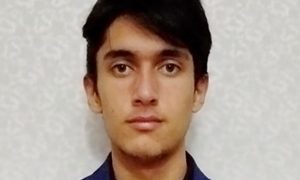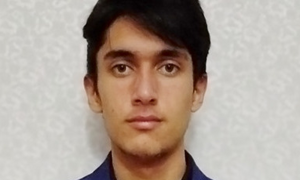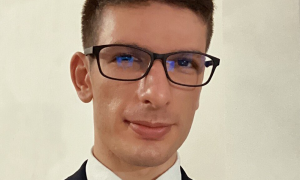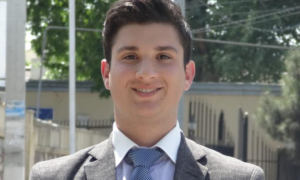Convicted and jailed after refusing compulsory military service on grounds of conscience, Jehovah’s Witness Seymur Mammadov failed to have his conviction and punishment overturned in his final appeal at Azerbaijan’s Supreme Court on 8 June.
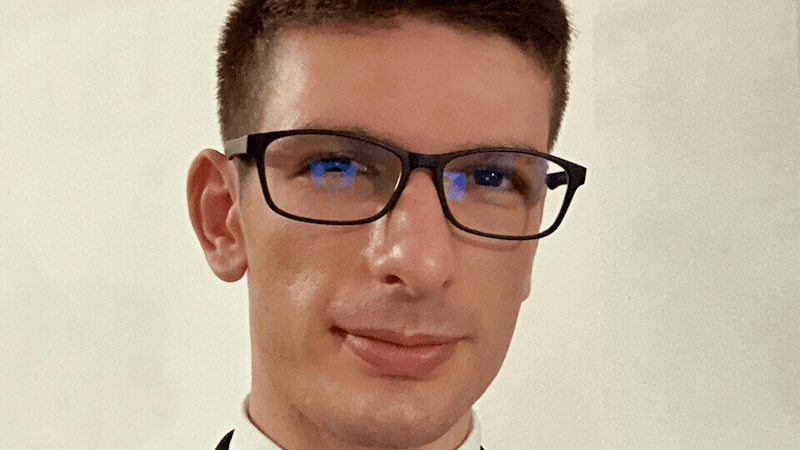
The 23-year-old Mammadov – who spent nearly 12 weeks in jail and is now in the middle of one year’s probation after his jail term was changed to a suspended sentence – is now considering a case to the European Court of Human Rights in Strasbourg.
The European Court of Human Rights (ECtHR) has already found that the regime violated the human rights of seven Jehovah’s Witnesses who had refused compulsory military service on grounds of conscience and sought in vain to do an alternative civilian service. The ECtHR issued its most recent judgments – in the cases of Emil Mehdiyev and Vahid Abilov – in October 2021
Although the regime paid the compensation specified by the ECtHR in 2019 to the first five conscientious objectors, the Council of Europe is not satisfied that the judgment has been fully implemented. “The Court pointed out that such a situation in principle calls for legislative action by the respondent State in order to fulfil its obligations to enable the applicants and other persons in the same situation to benefit from the right to conscientious objection”
In a report on Azerbaijan made public on 21 June 2023, the Council of Europe’s European Commission against Racism and Intolerance (ECRI) reminded the regime of ECtHR judgments that “called for legislative action on civilian service as an alternative to military service in Azerbaijan”
No draft Alternative Service Law has been presented to the Milli Majlis and no draft Law is listed for future consideration on the Milli Majlis website
ECRI noted that the regime had informed it that a Working Group had been formed in the Milli Majlis (Parliament) to draft an Alternative Service Law. Zahid Oruj, chair of the Milli Majlis Human Rights Committee, and parliamentary assistants were unable to give Forum 18 any information about the Working Group, including who is on it and if it has made any progress in drafting such a Law
Forum 18 asked Chingiz Asgarov, the government agent to the ECtHR, what steps Azerbaijan is taking to complete its execution of this ECtHR decision. Forum 18 received no immediate response.
Forum 18 again wrote to the Human Rights Ombudsperson’s Office in Baku asking what action it is taking (if any) to ensure that Azerbaijan introduces a civilian alternative service for those unable to serve in the army on grounds of conscience. Forum 18 received no immediate response
(In 2018 the Sub-Committee on Accreditation of the Global Alliance of National Human Rights Institutions downgraded the Azerbaijani Ombudsperson’s Office to B status because it “has not adequately spoken out in a manner that effectively promotes protection for all human rights, including in response to credible allegations of human rights violations having been committed by government authorities”.)
Council of Europe obligation ignored
Military service of 18 months (12 months for those with higher education) is compulsory for all young men. Article 76, Part 2 of Azerbaijan’s Constitution declares: “If the beliefs of citizens come into conflict with service in the army then in some cases envisaged by law alternative service instead of regular army service is permitted.” However, no mechanism exists to enact this provision.
Ahead of its accession to the Council of Europe in January 2001, Azerbaijan promised “to adopt, within two years of accession, a law on alternative service in compliance with European standards and, in the meantime, to pardon all conscientious objectors presently serving prison terms or serving in disciplinary battalions, allowing them instead to choose (when the law on alternative service has come into force) to perform non-armed military service or alternative Civilian service”.
Azerbaijan has never done this, and conscientious objectors to military service have been repeatedly prosecuted and even jailed under Criminal Code Article 321.1. This states: “Evasion without lawful grounds of call-up to military service or of mobilisation, with the purpose of evading serving in the military, is punishable by imprisonment for up to two years [in peacetime]”.
United Nations (UN) human rights bodies, as well as the Council of Europe’s Venice Commission and its European Commission against Racism and Intolerance (ECRI), have repeatedly criticised Azerbaijan’s failure to introduce a civilian alternative to compulsory military service .
In August 2019, the Baku Human Rights Club, which Rasul Jafarov heads, published its own proposal for the text of an Alternative Service Law to try to put the issue on the public agenda. “We have had no response to our proposal from official people,” Jafarov told Forum 18 in April 2020.
Jehovah’s Witness Royal Karimov was seized and handed over to the army on 25 July 2022 – two days after his 18th birthday – despite telling conscription officials in Gadabay, the police and personnel in the military unit that he cannot perform military service on grounds of conscience but is ready to perform a civilian alternative service. He was finally released from the military unit in Ganca on 1 November 2022, more than three months later.
On 29 November 2022, Karimov received official documentation from the State Service for Mobilisation and Conscription confirming that he is medically unfit for military service and giving the date of 14 October 2027 for his next medical examination. On 30 November 2022, Karimov filed an administrative complaint about the way he had been treated to the head office of the State Service for Mobilisation and Conscription, Jehovah’s Witnesses told Forum 18.
More than ten other Jehovah’s Witness young men have faced summonses, often repeated medical examinations and restrictions (including bans on leaving Azerbaijan) after telling the State Service for Mobilisation and Conscription that they cannot perform compulsory military service and that they are willing to perform an alternative, civilian service. At least one, who did not know he was banned from leaving Azerbaijan, was stopped on the border with Georgia in 2019 and sent back. He is still banned from leaving Azerbaijan.
Supreme Court upholds conviction for refusing military service on grounds of conscience
At the Supreme Court on 8 June 2023, Jehovah’s Witness Seymur Afqan oglu Mammadov (born 16 August 2000) lost his final appeal against his conviction and punishment for refusing military service on grounds of conscience.
Mammadov – who is from the north-western district of Goranboy – was summoned in May 2022 by Goranboy District State Service for Mobilisation and Conscription. He informed officers about his religious position as a conscientious objector to military service who is ready to perform civilian alternative service, as provided for by the Constitution and the decisions of the European Court of Human Rights. He was subsequently informed that he had been restricted from leaving the country.
On 22 September 2022, Goranboy District Court sentenced Mammadov under Criminal Code Article 321.1 to nine months’ imprisonment. He was taken to prison, where prison officials would not let him have a Bible or receive letters, Jehovah’s Witnesses told Forum 18. He appealed against his sentence.
Mammadov was brought to Ganca Appeal Court for the final hearing on 12 December 2022. The prosecutor stated that he supported the decision of Goranboy District Court but, given Mammadov’s age and positive character references, he requested a two-year suspended sentence. The court partially satisfied the appeal and replaced the nine-month jail term with a one-year suspended sentence.
Mammadov was released in the courtroom immediately after the hearing after nearly 12 weeks in jail. His probation of one year was deemed to begin on 12 December 2022 and he has a criminal record.
Mammadov’s final appeal was registered at the Supreme Court in Baku on 14 January 2023, according to court records. Officials fitted him with an electronic tag on 16 January, Jehovah’s Witnesses told Forum 18.
On 8 June, a panel of three judges at the Supreme Court in Baku, chaired by Judge Ilkin Rajabov, heard Mammadov’s final appeal against his conviction and punishment.
“The accused was repeatedly summoned to the State Service for Mobilisation and Conscription and Prosecutor’s Office and arrived at the place where he was called quickly every time, he never tried to avoid military service by running away or hiding, he simply asked the authorities to provide him with the opportunity to undergo alternative civilian service in compliance with the internal and international obligations assumed by the state,” the defence noted in court, according to the decision seen by Forum 18. “The accused should not be punished because there is no alternative civilian service law.”
Mammadov’s defence cited the constitutional guarantees of the right not to serve in the army on grounds of conscience, as well as those enshrined in the International Covenant on Civil and Political Rights and the European Convention on Human Rights. It also cited the European Court of Human Rights judgments in earlier cases. However, the Court rejected his arguments, claiming that because of armed conflict over Nagorno-Karabakh which broke out again in September 2020, “restriction of alternative service of citizens should be considered reasonable”.
“Neither Seymur nor his advocate were allowed to complete their prepared submissions and the Prosecutor simply asked for the appeal to be dismissed,” Jehovah’s Witnesses told Forum 18. “The deliberation was short and the judges did not leave the court before announcing that the cassation appeal was not granted.”
The Supreme Court left Mammadov’s one-year suspended sentence unchanged. He still has to wear the electronic tag, Jehovah’s Witnesses told Forum 18.
Now he has exhausted all domestic remedies, Seymur Mammadov is considering an appeal to the European Court of Human Rights in Strasbourg, Jehovah’s Witnesses told Forum 18.
“The problem of lack of legislation on alternatives to military service in Azerbaijan”
On 17 October 2019, in the case of Mushfiq Mammadov and others (Application No. 14604/08), the European Court of Human Rights (ECtHR) in Strasbourg found in favour of five Jehovah’s Witnesses punished through the courts between 2007 and 2013 for refusing compulsory military service on grounds of conscience. Four of them had been jailed, while the fifth (Mammadov) had been given a suspended prison sentence and a fine. The judgment covered four cases (one involving two applicants), which the Court considered together.
Although the regime paid the compensation specified by the ECtHR to the five conscientious objectors, the Council of Europe is not satisfied that the judgment has been implemented.
The Court “observed that the present case highlights the problem of lack of legislation on alternatives to military service in Azerbaijan, noting that the enactment of such a law corresponds to the commitment entered into by Azerbaijan on its accession to the Council of Europe and stems from the Article 76 § 2 of the Azerbaijani Constitution,” the Council of Europe notes.
“The Court pointed out that such a situation in principle calls for legislative action by the respondent State in order to fulfil its obligations to enable the applicants and other persons in the same situation to benefit from the right to conscientious objection.”
In such cases, the “respondent state” (in this case Azerbaijan) is required to prepare an action plan. “An action plan is a document setting out the measures the respondent state has taken and intends to take to implement a judgment of the European Court of Human Rights, including an indicative timetable for the adoption and implementation of those measures,” the Council of Europe explains.
“An action report is a report by the respondent state setting out all the measures taken to implement a judgment of the European Court of Human Rights and/or an explanation of why no measures, or no further measures, are necessary.”
In the case of Mushfiq Mammadov and others, “Action plan/report is awaited,” the Council of Europe notes.
Forum 18 asked Chingiz Asgarov, the Azerbaijani government’s Agent to the ECtHR, in writing on the afternoon of 13 July what steps Azerbaijan is taking to complete its execution of this ECtHR decision. Forum 18 received no response by the middle of the working day in Baku of 14 July.
ECRI renews concern over lack of alternative service, calls for “legislative action”
Officials have given mixed signals on whether they intend to fulfil the obligation to the Council of Europe to introduce a civilian alternative service for those who cannot serve in the army on grounds of conscience.
In its latest report on Azerbaijan adopted on 29 March 2023 and made public on 21 June, the Council of Europe’s European Commission against Racism and Intolerance (ECRI) noted its continuing concern over the situation of conscientious objectors, particularly over those who had been jailed. It said the regime had taken “no further steps” since ECRI raised the issue in its 2019 report.
ECRI reminded the regime of the 2019 ECtHR judgment in the case of Mushfiq Mammadov and others, noting that its implementation is still pending. It added: “ECRI strongly encourages the authorities to consider the observations made by the Court under Article 46 of the [European] Convention [on Human Rights], which called for legislative action on civilian service as an alternative to military service in Azerbaijan.”
In its response to ECRI on the initial draft of the report, the regime noted: “The working group has been established in the Milli Majlis for the purpose of drafting the law ‘On Alternative Service’.”
Is Working Group working on new Alternative Service Law?
No election in Azerbaijan – including February 2020 Milli Majlis (Parliament) elections – has ever been found to be free and fair by Organisation for Security and Co-operation in Europe (OSCE) election observers.
Despite the regime’s insistence to ECRI that a Working Group in the Milli Majlis is working on a new Alternative Service Law, Forum 18 has been unable to find out who is on the Working Group and what progress (if any) it has made.
No draft Alternative Service Law has been presented to the Milli Majlis and no draft Law is listed for future consideration on the Milli Majlis website.
Zahid Oruj, a Milli Majlis deputy who chairs its Human Rights Committee, told Forum 18 on 11 July that the Working Group is not under his Committee. He added that he does not have “detailed information about the latest update of the issue. We have no details of the endeavours of the re-set up Working Group.” He referred all questions to Ziyafat Asgarov, head of the Milli Majlis Defence, Security and Anti-Corruption Committee.
Asgarov’s assistant told Forum 18 on 13 July that Asgarov is on holiday. An assistant to the Defence, Security and Anti-Corruption Committee told Forum 18 the same day that he had no information about the Working Group. He said that as many colleagues are on holiday, it is impossible to find any information.
Forum 18 again wrote to the Human Rights Ombudsperson’s Office in Baku on the afternoon of 13 July asking what action it is taking (if any) to ensure that Azerbaijan introduces a civilian alternative service for those unable to serve in the army on grounds of conscience. Forum 18 received no response by the middle of the working day in Baku of 14 July.
Forum 18 earlier asked the Human Rights Ombudsperson’s Office the same question. Its 10 October 2022 response, signed by chief of staff Aydin Safikhanly, did not answer this question.
Lone parliamentary voice?
On 30 March 2020, Siyavush Novruzov, a senior ruling party politician, made a brief remark to parliament, the Milli Majlis, that an Alternative Service Law should be adopted.
Novruzov repeated the call in the Milli Majlis on 5 May 2022, according to the record of the session. “There are people whose health allows them, but their other views do not allow them to carry weapons,” he told deputies. “In the past, of course, our territories were under occupation. That’s why we approached it completely differently. But after we are freed from the occupation and our territorial integrity is ensured, I think that we should also adopt a law on alternative service.”
Novruzov explained to deputies that such alternative service would be carried out not in the military but in other parts of the economy, including health care. However, he proposed that the individual performing alternative civilian service serve for longer than those performing military service. “This is how he compensates for his place,” he insisted.
The right of those with conscientious objections not to be forced to take part in military structures or activity derives from Article 18 of the International Covenant on Civil and Political Rights (ICCPR), which enshrines “Freedom of thought, conscience and religion”. In states which have an alternative civilian service, such service must be open to all who object to military service on grounds of conscience and must not be punitive (for example by its conditions or duration).
Forum 18 wished to find out from Novruzov why he was proposing that those performing alternative civilian service should serve for longer and what progress there has been on adopting a law. However, he did not answer his phone each time Forum 18 called between 11 and 14 July.
